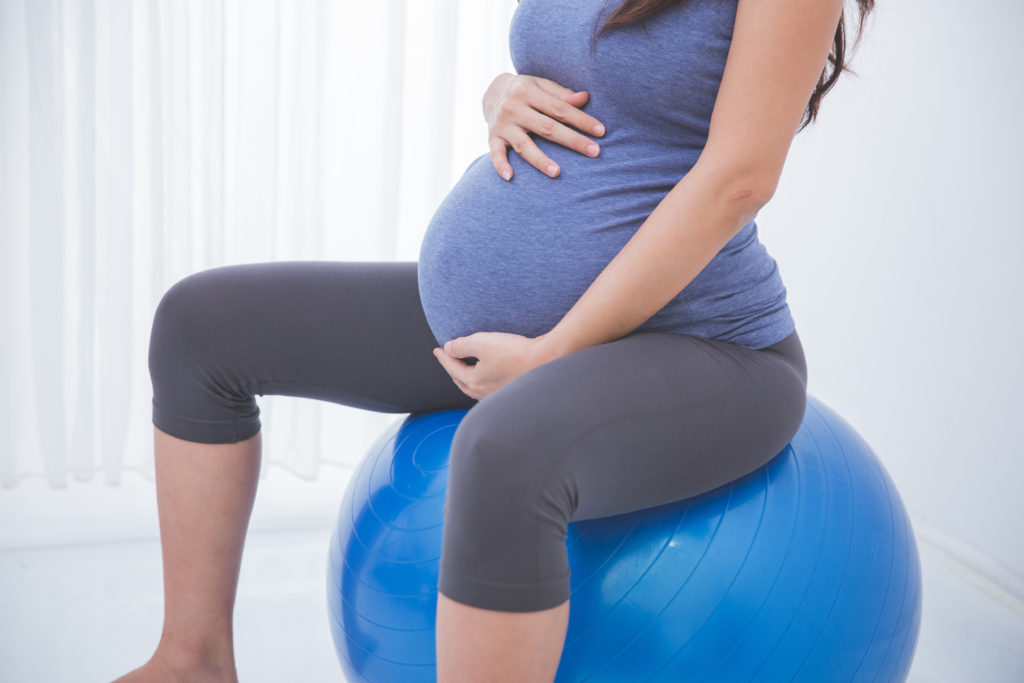There are many benefits to prenatal exercise. Research supports the benefits of regular exercise and its safety in women with normal uncomplicated pregnancies. Physical activity should be considered a front-line therapy for reducing the risk of pregnancy complications and enhancing maternal physical and mental health.

Prenatal physical activity is associated with:
- Reduced muscle aches and pains
- Reduce risk of preeclampsia, gestational diabetes, C-section, and urinary incontinence
- Reduce fatigue and insomnia
- Improve mood and reduce symptoms of depression
- Decreases total gestational weight gain
- Is associated with fewer newborn complications (eg, large for gestational age)
- And it may also be related to shorter and uncomplicated labors
“Pregnant women should try to accumulate at least 150 minutes of moderate intensity physical activity each week.“
Prenatal exercise guidelines and considerations
Pregnant women should try to accumulate at least 150 minutes of moderate intensity physical activity each week. Physical activity should be accumulated over a minimum of 3 days per week; however, being active every day is encouraged.
What about intensity? Use the talk test to determine moderate intensity – you should be able to maintain a conversation during physical activity and if that is not possible you should reduce your intensity.
What type of exercise?
It’s recommended that pregnant women incorporate a combination of aerobic and resistance training to achieve the greatest benefits. Yoga, gentle stretching, and lower intensity exercise such as walking also provides positive results.
How to start being active during pregnancy?
Previously inactive women are encouraged to start physical activity during pregnancy, but start gradually and build your exercise duration and intensity over time, for example start with 10 minutes of exercise every second day and gradually work up to 30 minutes as able.
Pregnant women should start or remain physically active even if they are unable to meet these recommendations – a little activity is better than none!
Are there any contraindications to parental exercise?
All pregnant women can participate in physical activity throughout pregnancy with the exception of those who have contraindications (see below). Women with absolute contraindications may continue their usual activities of daily living but should not participate in more strenuous activities. Women with health concerns that are not listed below should check with their obstetric provider before starting an exercise routine.
Prenatal exercise should be avoided if you experience any of the following:
- High-order multiple pregnancy (eg. triplets)
- Uncontrolled Type I diabetes, hypertension or thyroid disease
- Preeclampsia or pregnancy-induced high blood pressure
- Serious heart, lung or systemic disorders
- Incompetent cervix
- Placenta praevia after 28 weeks gestation
- Ruptured membranes
- Premature labour
Are there any safety considerations?
- Avoid exercising in excessive heat and humidity
- Avoid activities that have a risk of physical contact of falling
- Avoid scuba diving
- If you live at a lower altitude (below 2500m), you should avoid exercising at altitude above 2500m, or consult with your care provider before you do so
- Stay well hydrated before, during and after activity
Reason to stop exercising and consult a healthcare provider
- Excessive shortness of breath that does not resolve with rest
- Regular and painful uterine contractions
- Vaginal bleeding
- Severe chest pain
- Persistent loss of fluids for the vagina indicating rupture of the membranes
- Persistent dizziness or faintness that does not resolve with rest

(Please note -typical Women’s Health sessions are conducted in a private room)
When should I see a Women’s Health physiotherapist?
You should see out the help of a pelvic health physiotherapist if you experience any of the following with exercise or your daily activities:
- If you are experiencing any pain in in your back, hips or into you legs
- Breath-holding
- Incontinence
- Pelvic pressure of heaviness
- Tenting/doming of your abdomen
Lynsey Pasloski
Physiotherapist at Pivotal Physiotherapy
Women’s Health Therapist
Ask me a question
Book an appointment with Lynsey
References:
